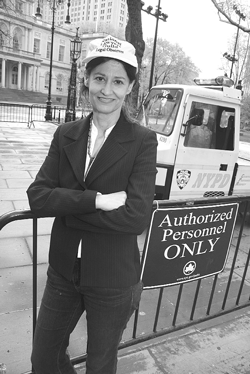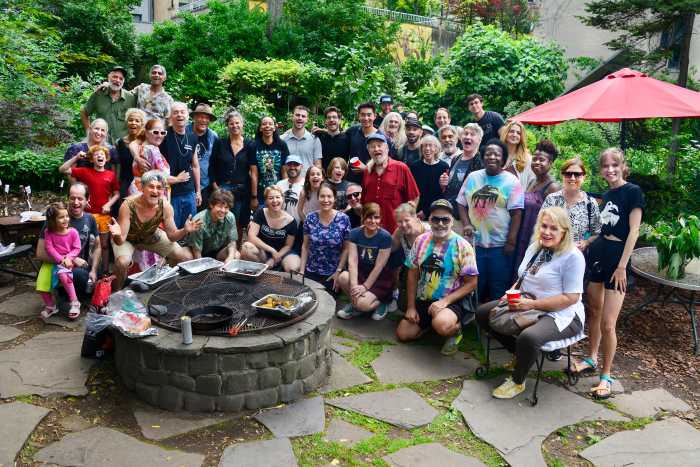By Jefferson Siegel
Pro bono publico is the Latin phrase meaning “for the public good.” It connotes the legal profession’s performance of free work as a public service. The work is a suggestion by bar associations, not a mandate.
One group of motivated, idealistic lawyers and legal students takes that concept to heart, striving to tip the scales of justice in favor of civil rights and civil liberties. Their pro bono work is a voluntary undertaking, often consuming more hours than a full-time job.
The National Lawyers Guild was founded in 1937 and in the intervening 70 years has championed democracy and justice on behalf of those lacking a voice or influence within the status quo.
Heidi Boghosian, an East Villager, is the executive director of the guild’s national office, located on Nassau St. in Lower Manhattan. While at Temple Law School in Philadelphia, she said, friends advised her that, “because of my progressive interests, the guild would be a natural fit.”
Boghosian’s activism blossomed in the turbulent ’80s as a writer and editor for the now-defunct East Villager newspaper. She covered riots, the early stages of gentrification and other political forces swirling through Alphabet City.
“There would be protests on a regular basis and police in riot gear would come out and line the streets,” she recalled.
In those days legal observers were virtually nonexistent. Today volunteer N.L.G. observers are a ubiquitous sight, their presence intended to reassure demonstrators in the face of a large police presence and provide the resources of legal assistance. Their electric-green hats are visible at antiwar protests and Critical Mass rides. Earlier this month, they could be seen dotting the crowd at the immigrants’ rights rally that filled Broadway from Grand St. to City Hall with hundreds of thousands of people. On that Monday alone, the guild fielded 70 volunteer legal observers.
“I think we call it a measure of our success that we are now known by the police for providing a presence,” Boghosian noted.
However, Boghosian is concerned that the expression of dissent in the current political climate finds many dissuaded by intimidation and exaggerated reports of violence.
“We’re seeing escalated coordination on all levels,” she continued, “federal government, local, F.B.I. And we’re seeing protesters being treated virtually as the enemy.”
The guild counts lawyers, law students, legal workers and jailhouse lawyers among its members. Guild volunteers’ tireless devotion to justice takes many forms but was perhaps best exemplified during the 2004 Republican Convention. During that week police used swaths of orange netting to make mass arrests, sweeping up journalists, cyclists and even tourists among crowds of demonstrators expressing their constitutional right to protest.
Many arrestees were held for two days or longer in the now-infamous Pier 57, dubbed “Little Guantanamo on the Hudson” for its crowded and hazardous conditions. Guild volunteers took up round-the-clock positions outside the pier and at the courts Downtown, ultimately forcing a state judge to order that the city observe habeas corpus and bring detainees to arraignment in a timely manner. To date, over 90 percent of the 1,800 protester arrests made the week of the R.N.C. have been dismissed.
Boghosian thinks interest in “people’s lawyering” forms in law school. The guild’s on-campus presence counters “what we perceive is a rather conservative, even corporate-minded climate in most law schools in this country.”
“We hold what we call ‘disorientation week,’ ” Boghosian explained, “when law schools are holding their traditional orientations.” A disorientation handbook exhorts law students how to preserve personal values, or as she put it, “how to save your soul, how to survive and how to really take charge of your legal education by getting involved in activities that benefit your community or that further social causes.”
Boghosian believes that, “People are attracted to us and our community. They feel comfortable plugging into work that we may be doing, or doing work in our name. It’s a natural extension of how they have chosen to live their lives and how they have chosen to practice law. It’s basically ‘cause’ lawyering. One may need to be creative in finding a way to partner doing the work that they love with finding a way to make enough money to have a living. Many of our attorneys have done that.”
One lawyer fitting that profile is Bruce Bentley, an attorney for the Civil Service Technical Guild of Professional Employees Legal Services. He’s also been a N.L.G. member for 33 years. Currently the chairperson of the New York N.L.G. chapter’s Mass Defense Committee, Bentley coordinates the presence of legal observers at rallies, marches and protests.
“We have developed a panel of volunteers who have offered to be legal observers, which includes lawyers, law students and legal workers,” he explained. “For law students, it provides them an opportunity to be involved directly with what could be the beginning of a criminal case in giving them the perspective of a witness.”
Volunteers learn First Amendment values in the context of events where those rights are being exercised and face the threat of being violated.
“We’ve had volunteers who have provided ‘Know Your Rights’ training to community and political organizations,” Bentley added. Volunteer training also includes work on tenants rights and unemployment compensation.
Village resident Nina Reznick practices in the specialized field of entertainment law. Reznick, too, wears the lime-green hat of the guild legal observer.
“It’s very touching how many people thank you, when you’re in your green hat, for being there,” said Reznick.
Yet, Reznick has also encountered skeptics claiming that the social justice movement is either boringly repetitive or, worse, dead.
“Being a legal observer, if it does any good at all, it certainly makes people who are demonstrating feel more confident,” she noted.
But why would a highly successful attorney volunteer away so many billable hours?
“This is something that lawyers and law students and people who have a real concern for protecting dissent are drawn to,” Reznick affirmed. “The guild is certainly
made up of the kind of lawyers and the kind of thinking that makes me most proud to be a lawyer.”
The guild lawyers, she says, “are caring, extraordinary human beings. They are not at all the image that the lawyer jokes put forth.”
In addition to legal observing, guild volunteers work on immigrant rights policy issues, litigation policies and police accountability.
“Our volunteers are our members and they feel they’re invested in how the organization is run,” Boghosian said proudly. “They set policy, they e-mail us on a daily basis. We try to shape our programs and management policies around what our members want. They’re really the lifeblood of the guild.”
Still, the question persists: Why would members of a well-remunerated profession spend nights, weekends and even vacation time helping those without a voice? Boghosian doesn’t hesitate in answering.
“The majority of our members are driven by a social conscience. We are a multi-issue organization, so that we have members around the country doing a lot of different kinds of progressive lawyering. We call it ‘people’s lawyering.’ We stay true to our vision of what a democracy should look like.”






































